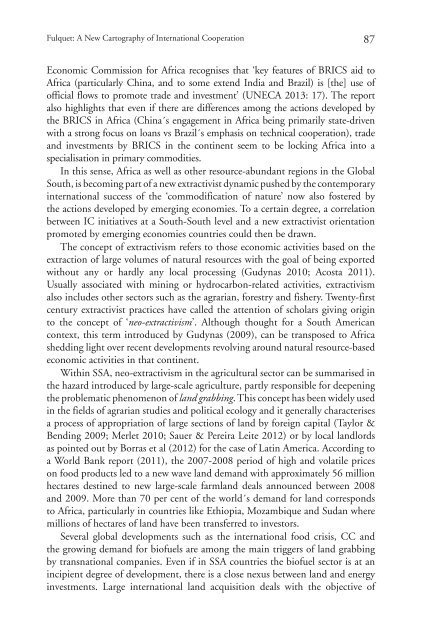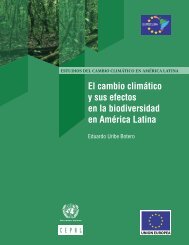Inequality and Climate Change Inégalité et changement climatique
Inequality
Inequality
Create successful ePaper yourself
Turn your PDF publications into a flip-book with our unique Google optimized e-Paper software.
Fulqu<strong>et</strong>: A New Cartography of International Cooperation 87<br />
Economic Commission for Africa recognises that ‘key features of BRICS aid to<br />
Africa (particularly China, <strong>and</strong> to some extend India <strong>and</strong> Brazil) is [the] use of<br />
official flows to promote trade <strong>and</strong> investment’ (UNECA 2013: 17). The report<br />
also highlights that even if there are differences among the actions developed by<br />
the BRICS in Africa (China´s engagement in Africa being primarily state-driven<br />
with a strong focus on loans vs Brazil´s emphasis on technical cooperation), trade<br />
<strong>and</strong> investments by BRICS in the continent seem to be locking Africa into a<br />
specialisation in primary commodities.<br />
In this sense, Africa as well as other resource-abundant regions in the Global<br />
South, is becoming part of a new extractivist dynamic pushed by the contemporary<br />
international success of the ‘commodification of nature’ now also fostered by<br />
the actions developed by emerging economies. To a certain degree, a correlation<br />
b<strong>et</strong>ween IC initiatives at a South-South level <strong>and</strong> a new extractivist orientation<br />
promoted by emerging economies countries could then be drawn.<br />
The concept of extractivism refers to those economic activities based on the<br />
extraction of large volumes of natural resources with the goal of being exported<br />
without any or hardly any local processing (Gudynas 2010; Acosta 2011).<br />
Usually associated with mining or hydrocarbon-related activities, extractivism<br />
also includes other sectors such as the agrarian, forestry <strong>and</strong> fishery. Twenty-first<br />
century extractivist practices have called the attention of scholars giving origin<br />
to the concept of ‘neo-extractivism’. Although thought for a South American<br />
context, this term introduced by Gudynas (2009), can be transposed to Africa<br />
shedding light over recent developments revolving around natural resource-based<br />
economic activities in that continent.<br />
Within SSA, neo-extractivism in the agricultural sector can be summarised in<br />
the hazard introduced by large-scale agriculture, partly responsible for deepening<br />
the problematic phenomenon of l<strong>and</strong> grabbing. This concept has been widely used<br />
in the fields of agrarian studies <strong>and</strong> political ecology <strong>and</strong> it generally characterises<br />
a process of appropriation of large sections of l<strong>and</strong> by foreign capital (Taylor &<br />
Bending 2009; Merl<strong>et</strong> 2010; Sauer & Pereira Leite 2012) or by local l<strong>and</strong>lords<br />
as pointed out by Borras <strong>et</strong> al (2012) for the case of Latin America. According to<br />
a World Bank report (2011), the 2007-2008 period of high <strong>and</strong> volatile prices<br />
on food products led to a new wave l<strong>and</strong> dem<strong>and</strong> with approximately 56 million<br />
hectares destined to new large-scale farml<strong>and</strong> deals announced b<strong>et</strong>ween 2008<br />
<strong>and</strong> 2009. More than 70 per cent of the world´s dem<strong>and</strong> for l<strong>and</strong> corresponds<br />
to Africa, particularly in countries like Ethiopia, Mozambique <strong>and</strong> Sudan where<br />
millions of hectares of l<strong>and</strong> have been transferred to investors.<br />
Several global developments such as the international food crisis, CC <strong>and</strong><br />
the growing dem<strong>and</strong> for biofuels are among the main triggers of l<strong>and</strong> grabbing<br />
by transnational companies. Even if in SSA countries the biofuel sector is at an<br />
incipient degree of development, there is a close nexus b<strong>et</strong>ween l<strong>and</strong> <strong>and</strong> energy<br />
investments. Large international l<strong>and</strong> acquisition deals with the objective of





